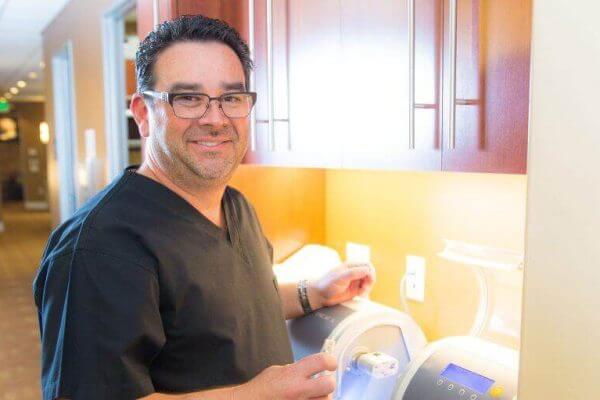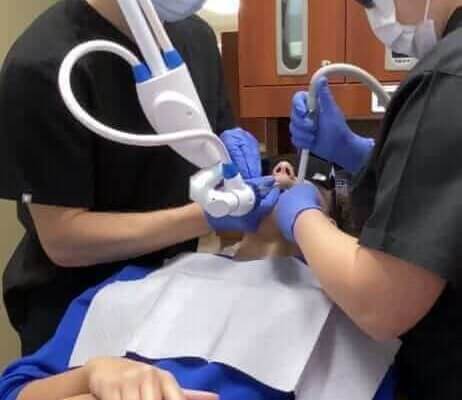A Wildomar Dentist Can Battle Dementia
A study published last July in Medical News Today illustrates that poor dental health and gum disease can cause Alzheimer’s, and regular cleanings by your family dentist may help reduce your risk.
Based on statistics from the National Institute on Aging, between 2.4 million and 4.5 million Americans suffer from this disorder, which results in dementia from the loss of neurons in the brain. The condition is progressive, and currently, there is no cure.
One-third of all elderly U.S. citizens will contract this disease, and the mortality rate of those with this condition increased by 68 percent from 2000 to 2010. Fortunately, new medical research presents a number of ways to prevent Alzheimer’s and slow its progression. Regular visits to a family dentist are among the most effective methods.
Your Family Dentist May Help Prevent Dementia
In the United Kingdom, researchers from the University of Central Lancashire School of Medicine and Dentistry correlated the presence of Porphyromonas gingivalis with Alzheimer’s disease. This bacterium is responsible for the development of periodontal disease, and if poor oral hygiene is left untreated, the infection can spread to the bloodstream.
If you reside in Wildomar or any other cities in Riverside County, Dr. Derek B. Hauser, DDS, can help you prevent and reverse periodontal disease. After two decades in the field of dentistry, Dr. Hauser has perfected the art of treating even the most serious cases.
Twenty percent of Dr. Hauser’s practice is composed of elderly patients who have been under his care for a number of years. He also is a highly skilled cosmetic dentist that is familiar with elderly patients’ oral-care needs. Contact Lakefront Family Dentistry at (951) 244-9495 or Request an Appointment Online Today!
Alzheimer’s Disease Is Linked To Poor Oral Hygiene
In the U.K. study, researchers examined 10 people afflicted by Alzheimer’s disease and determined that the levels of Porphyromononas gingivalis in their brain tissue were much higher than those in patients that did not suffer from the disorder.
This correlation indicates that Porphyromononas gingivalis may exacerbate or even cause the condition. But how does a bacterium in the mouth affect the brain?
The bacterium enters the brain through the bloodstream. As periodontal disease progresses, gaps begin to form between the gum and the teeth, giving the bacterium access to the vessels below.
Therefore, it is important to practice good oral care habits every day and to attend teeth cleaning appointments twice each year. If you notice any signs of periodontal disease, immediately contact your family dentist.
Early Symptoms Include:
- Gums lose their pink color and turn purple or red.
- Bleeding occurs while brushing and flossing.
- Patients notice abnormally bad breath.
- Gums swell and become sensitive.
- Gums become less firm.
One Molecule of Bacteria Can Damage The Brain
The group of researchers that conducted the U.K. study now is working with the University of Florida. Their new goal is to prove that Porphyromononas gingivalis is present in the brain tissue of animals when they contract periodontal disease. A positive conclusion would support the findings of the original study.
The researchers believe that every time one molecule of this bacteria reaches the brain, it automatically stimulates an immune system response, causing the release of chemicals that destroy neurons. They believe that this is what produces the neurological changes associated with Alzheimer’s.
Your Family Dentist Can Help You Start an Effective Oral Care Routine
The message is simple: through proper dental care that prevents periodontal disease, patients reduce their risks of developing Alzheimer’s.
An effective routine will incorporate the following:
- Brushing teeth twice daily
- Flossing at least once each day
- Keep dental appointments twice per year
- Using a mouthwash recommended by your family dentist, such as Colgate Peroxyl
- Fixing physical damage to the teeth that prevents proper oral care
The last point in this list should not be overlooked. Cracked and misaligned teeth can prevent patients from properly brushing and flossing. They may leave food particles behind that allow bacteria to survive.
Fortunately, if you’re in the Wildomar area, Dr. Hauser has 10 years of experience with CEREC technology. This stands for Chairside Economical Restoration of Esthetic Ceramics.
The beauty of this process is that many of the most popular cosmetic treatments, such as crowns and veneers, can be completed in only one visit. Not only will these procedures make your teeth more manageable for brushing and flossing, but they also can leave you with a bright, white and beautiful smile!
If you think that you suffer from periodontal disease or if you’re shopping around for a new Wildomar family dentist or any other area of Riverside County, Contact Lakefront Family Dentistry at (951) 244-9495 or Request an Appointment Online Today!




